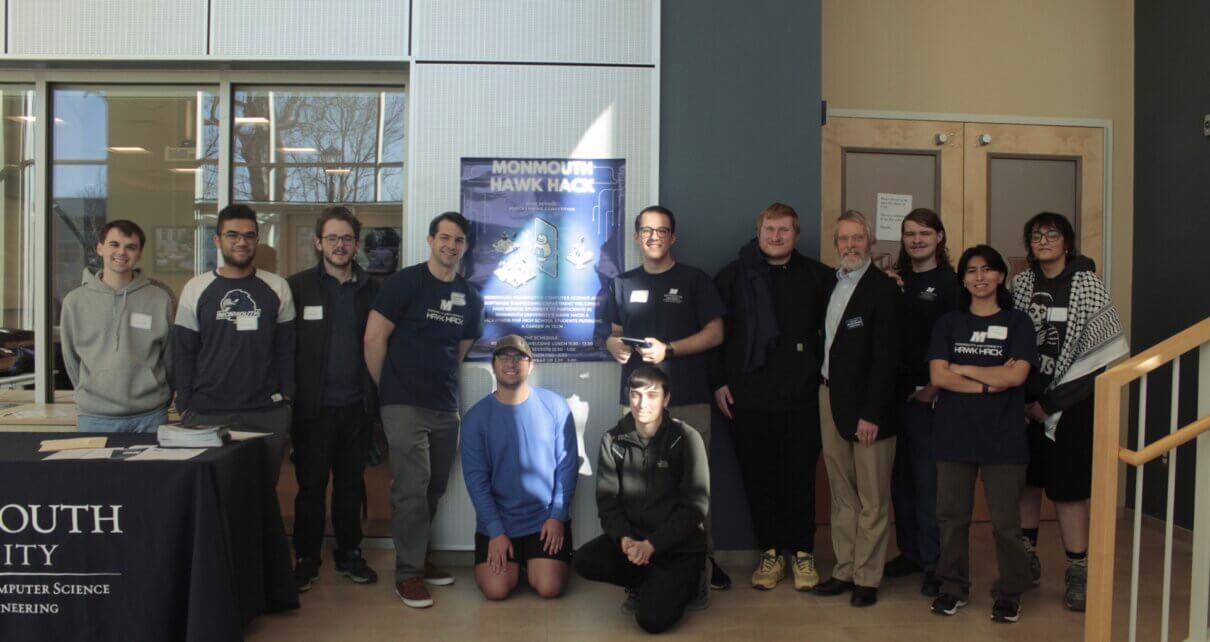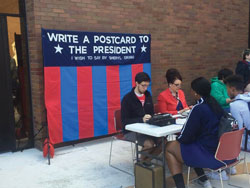On Friday, Feb. 16, the Institute of Electrical and Electronic Engineers/Association of Computing Machinery (IEEE/ASM) Club, in partnership with the Department of Computer Science and Software Engineering (CSEE), hosted its annual High School Hawk Hack. The event, formerly called the High School Programming Competition, hosted high school students from around the state in Edison Hall to compete in solving Java programming challenges.
This year, Hawk Hack boasted its biggest competition yet, with 12 New Jersey high schools sending 57 students to participate. It is also the second competition held since a three-year hiatus was instituted following the COVID-19 pandemic; the first competition was held in February 2023.
Students who attend have learned the Java programming language from high school courses, like AP Computer Science. From there, they are placed into teams of two to three and presented with difficult, real-world coding problems where they can showcase their programming knowledge by solving. The problems are created by IEEE/ASM club members, who ensure that the problems align with high school curriculums. Club members also coach students through the solving process while monitoring that the rules of the competition are followed.
Joseph Furmanowski is a computer science major and serves as President of the IEEE/ASM Club. He helped design program challenges and recruited student volunteers within the CSSE Department to help on competition day along with other members of the IEEE/ASM Club Executive Board. He—in addition to a few other department and club members—previously participated in Monmouth Hawk Hack as a high school student.
“I think that what sets this event apart from similar events at other institutions is that it is both student- and faculty-led,” explained Furmanowski. “The IEEE/ACM Club is so grateful to have had the opportunity to lead this event in collaboration with CSEE Department Chair Dr. Rosca, Dr. Raman Lakshmanan, Professor Rolf Kamp, and CSSE Secretary Christy Jenkins.”
He continued, “Students were able to be deeply involved in all parts of the event, from designing the problems to ensure that they align with high schoolers’ coursework, and even proctoring the teams during the competition. Students and faculty worked together tightly to make this event fun and successful.”
The Hawk Hack event also allows high school students to learn more about Monmouth’s CSSE program, potentially attracting them to attend the University. Rolf Kamp, Specialist Professor of CSSE and the IEEE/ASM Club’s faculty advisor, said, “In some respects, the Hawk Hack is a recruiting exercise as it publicizes Monmouth’s CSSE Department and attracts the area’s best and brightest computer science students to the University… the high school students’ chaperons—generally their high school teachers—are treated to a campus tour by admissions staff while the students participate in the competition.”
High school students who attend additionally gain a number of educational and networking benefits, according to Furmanowski. He said, “Students who attend this event learn how to apply their Java programming knowledge gained from their high school courses, learn how to work in teams of two to three students to solve difficult problems, learn about Monmouth’s CSSE Department and the different majors offered by the School of Science, learn about career tracks within the tech industry, get to interact and network with University students and professors and make valuable connections prior to becoming college students, and get a taste of the CSSE curriculum and the cool projects that students have made during their time at Monmouth.”
While every participating high school student took home a Hawk Hack T-shirt, only the top three winners were awarded prizes. In first place, Middlesex High School was awarded three drones; in second place, Dwight-Englewood School was awarded three robots; in third place, Lakeland High School was awarded three Steam gift cards.
“It is truly an enjoyable, fun day as students compete with other high schools, seeing who can ‘score’ the best and win prizes,” concluded Kamp. “Students thoroughly enjoy the camaraderie—both within their school and between competing schools.”



